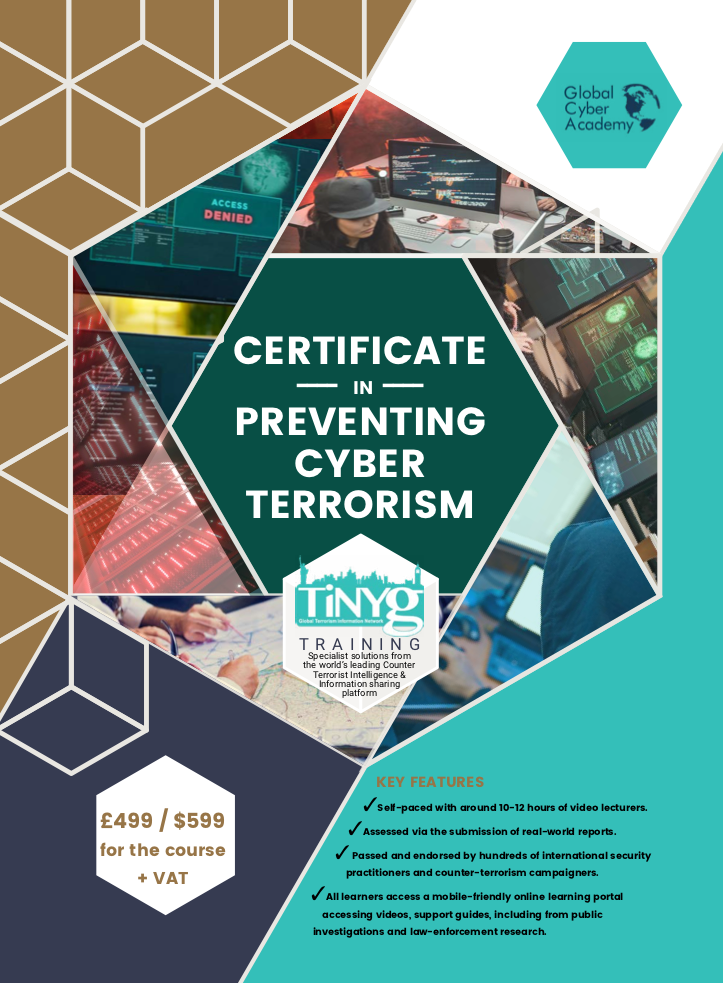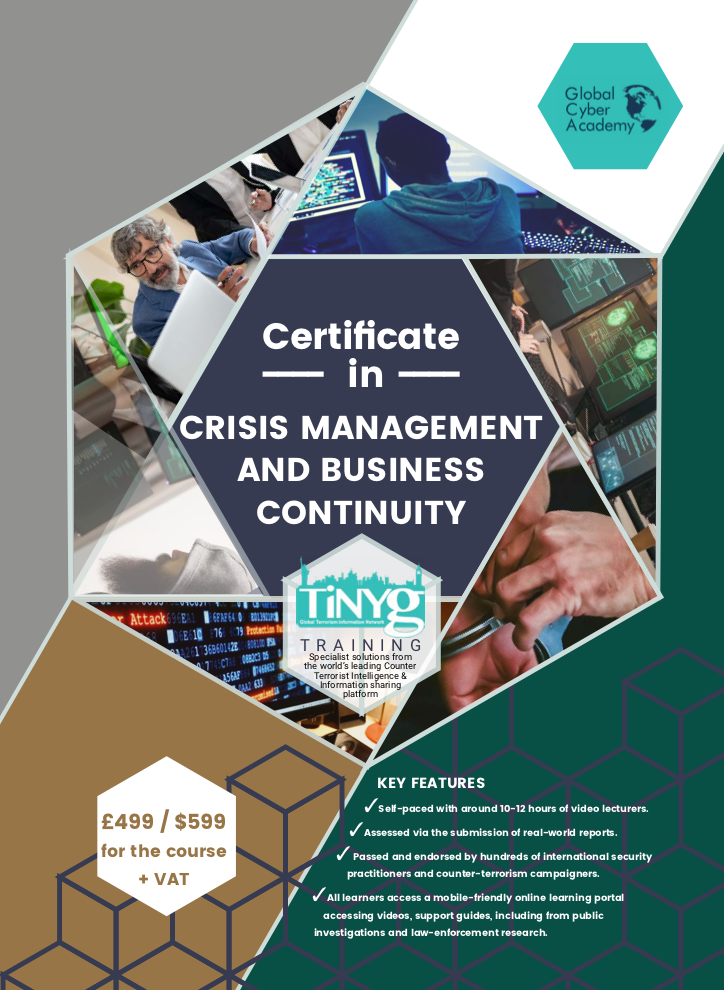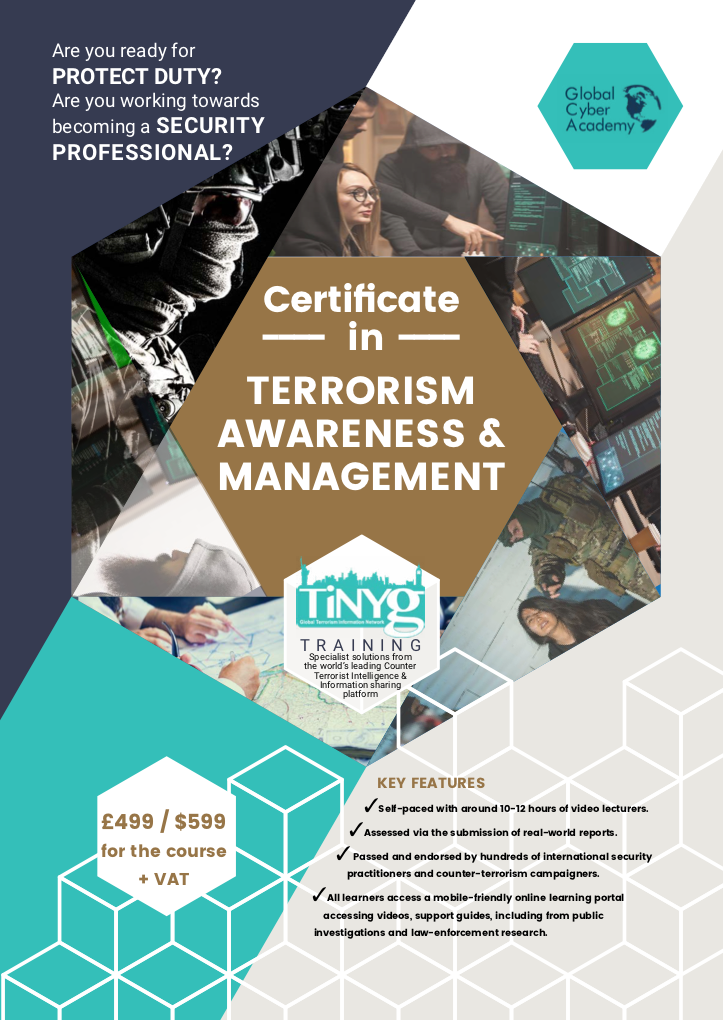PREVENTING CYBER TERRORISM
CERTIFICATE IN PREVENTING CYBER TERRORISM
Defending against Cyber Terrorism and Online Extremism has become one of the most significant workplace challenges of our time.

KEY FEATURES
✓Self-paced with around 10-12 hours of video lecturers.
✓Assessed via the submission of real-world reports.
✓ Passed and endorsed by hundreds of international security practitioners and counter-terrorism campaigners.
✓All learners access a mobile-friendly online learning portal accessing videos, support guides, including from public investigations and law-enforcement research.
COURSE INSTRUCTOR
Richard Bingley FHEA PGCLTHE
Senior Instructor in Cybersecurity and Incident Management and author of the book ‘Combatting Cyber Terrorism’.

More Details
TEN COMPELLING REASONS COMPANIES AND STAFF SHOULD INVEST IN CYBERSECURITY
- Avoid massive financial loss
- Mitigate growing global threat – Cybercrime is projected to cost the world up to US $10.5 trillion annually by 2025.
- Enhance business/operational resilience – Strong incident response capabilities can reduce breach costs by approximately US $1.76 million.
- Stay ahead of regulatory risks – Non-compliance (e.g. dataprotection laws) can trigger huge fines, making security investment an essential risk control.
- Protect brand reputation & trust – A major breach can damage customer confidence and brand value far more than the immediate cost of an attack.
- Safeguard staff and stakeholder data – Protecting employee and customer data reduces human harm, legal exposure and internal disruptions.
- Support digital transformation securely – With remote work, cloud services & AI growing, vulnerabilities are increasing and need proactive mitigation.
- Advance competitive advantage – Organisations that manage cyber risk effectively differentiate themselves and can win business where trust matters.
- Control insurance & cost of capital – Cybersecurity investment can reduce insurance premiums and enable better access to capital by lowering risk profile.
- Address workforce skills gaps – With 79% of organisations planning increased spend in 2025, ensuring staff are cyber-aware is a strategic imperative.
COURSE OBJECTIVES
- Define and distinguish cyber terrorism from hacktivism, cybercrime, and other forms of digital threats.
- Understand the historical evolution and role of nation-states in cyber terrorism.
- Assess threats to advanced technologies and critical infrastructure.
- Utilize cyber threat intelligence to monitor and mitigate risks.
- Apply strategic approaches to prevent, deter, and disrupt cyber terrorism activities.
- Conduct risk assessments and develop effective risk management plans.
- Implement comprehensive incident response and investigation procedures.
- Understand the basics of Investigations and digital forensics.
- Strengthen business resilience against cyber terrorism threats.
- Reflect on lessons learned from past incidents to enhance future preparedness.
COURSE STRUCTURE
The course is divided into several key sections:
- What is ‘Cyber Terrorism’? Laws and definitions.
- Threat analysis.
- Role of Social Media, Decentralized Web (DWeb) platforms, Gaming and Violent Extremism.
- Advanced technologies: Risk Management related to AI including Robots, ChatBots, and UAVs.
- Threat Intelligence and Cyber Threat Intelligence
- Defending the attack surface – People, Systems and Facilities (Converged).
- Incident Response.
- Investigations.
- Summary of relevant laws and ISO/NIST guidance throughout.
COST
£399/$499 + VAT
For information on dates and availability
Other courses...
CRISIS MANAGEMENT AND BUSINESS CONTINUITY
Mishandling a crisis, incident response, or failing to prepare for an emergency, can permanently shut-down or bankrupt an organisation and/or lead to serious and highly-visible sanctions against company leaders.
Many organisational crises in business and public sector institutions begin with a series of small trigger incidents, which – taken together – can come to overwhelm an organization, sector, or nation, before senior-decision-makers are able to organise a response that can mitigate hazards and threats.


TERRORISM AND AWARENESS MANAGEMENT
Businesses and security professionals are increasingly concerned about delivering their employees and customers a professional level in ‘duty of care’ in countering terrorism. This course formally educates and accredits attendees in understanding and potentially mitigating terrorism events in and around their premises and events. It is applicable to all first-responders, police personnel and security professionals in any international territory, particularly those facing potential new legislation, such as the Protection of Premises Bill (Martyn’s Law) in the UK or various legal revisions elsewhere.

Understanding terrorism by bringing together experts, in a trusted environment to increase awareness of threats & develop capabilities to prepare and respond.
